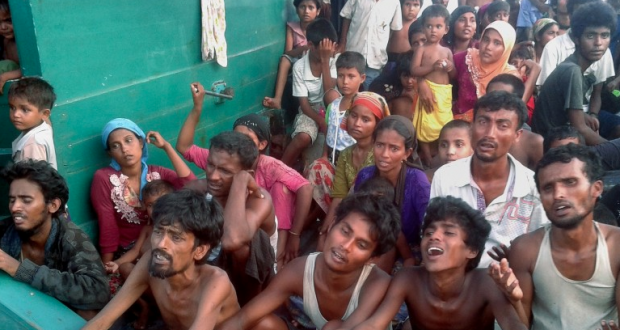 Robin Yassin-Kassab:
Robin Yassin-Kassab:
"It's terrible that they do control half of Syria, but of course most of the area they control is desert. So they don't actually control much of the populated areas, so it's over-exaggerated. It's very sad that minds are focused on Syria, whenever these horrific pirates, these strange people with their black flags in ISIS, do something very photogenic, when they cut the head off an American, or when they destroy some heritage, then immediately everybody pays attention, but people haven't been paying attention to what's been going on otherwise, which is much more significant.
Recently, a combination of the Free Syrian Army, the Islamic Front, and Jabhat al-Nusra, which is a jihadist group, have defeated the Assad régime in Idlib, in Jisr al-Shugour, in the Mastoumeh military base, at the Nasib border crossing in the south, at Tel Kurbi just outside Damascus; so there's a string of defeats for this régime, which has been propped up by Iran , mainly; Iranian occupation forces and Lebanese and Iraqi Shia militias backed by Iran; and the régime is now in the biggest trouble that it's been, that despite all of these Iranian forces, Lebanese and Iraqi forces, on its frontlines, it's losing battle after battle after battle. ISIS, the "Islamic State", has also been defeated by the rebels. The media rather lazily seems to equate ISIS with the opposition, but ISIS is really a third force which is exploiting the chaos in Syria to come in and expand where it can. It's really very unpopular amongst Syrians, as is the Assad régime.
ISIS has been defeated by the rebels, who are at war with it, in the Qalamoun region, in Quneitra, in the Damascus suburbs, just in the last couple of months. On the other hand, ISIS is defeating the Assad régime in Palmyra, and a couple of days ago it defeated the US-backed Iraqi army in Ramadi. So at the moment the strongest player on the ground seems to be a combination of the Free Syrian Army and the Islamic Front.
Recently, it seems that things have changed around. I think one reason for this is just the exhaustion of Assad's forces. He's really down to the foreign powers that will help him, and his very narrow sectarian base. The vast majority of the Syrian people have deserted him, his economy is collapsing, and he's running out of men. I think that's the crucial factor. The second factor is that the Islamic Front groups, that's different groups as well, and the Free Army groups, have recently been able to work together much better than they had ever been able to do so before. They've become much better organised, and much more cohesive. They've formed new alliances, one called the Army of Conquest, which has been winning so many battles in the north. So it's a sign, I think, of various things; it's a sign of the new cohesion of the rebel groups, a sign of the exhaustion of the Assad régime, and also a sign that Saudi Arabia and Turkey have put aside their differences, and Qatar as well, the regional powers have recognised the huge threat of Iranian troops in Iraq and in Syria, and how this is just expanding the Sunni jihadist appeal, and they've decided to give much more anti-tank weaponry to the Free Syrian Army."
Before that, Jim Muir had said, "It seems that the bulk of the population has fled, certainly that's the government narrative." It isn't true*, just as they left the lower ranks to be massacred when they lost Tabqa airbase**, but it is easier to report the Assad version as the plausible Syrian narrative, rather than point out it has been a lie from Day One, which would involve more careful reporting.
* "The official line of the Syrian military and State media is that President Assad’s forces evacuated all civilians as they fled on Wednesday. However, residents have said only high-ranking military officers and their families, as well as some “collaborators”, were able to leave." [http://eaworldview.com/2015/05/syria-daily-civilians-trapped-in-palmyra-after-islamic-state-takeover/]
**[http://www.dailymail.co.uk/news/article-2736764/Marched-deaths-Sickening-ISIS-slaughter-continues-250-soldiers-captured-Syrian-airbase-stripped-led-desert-mass-execution.html]







.png)




